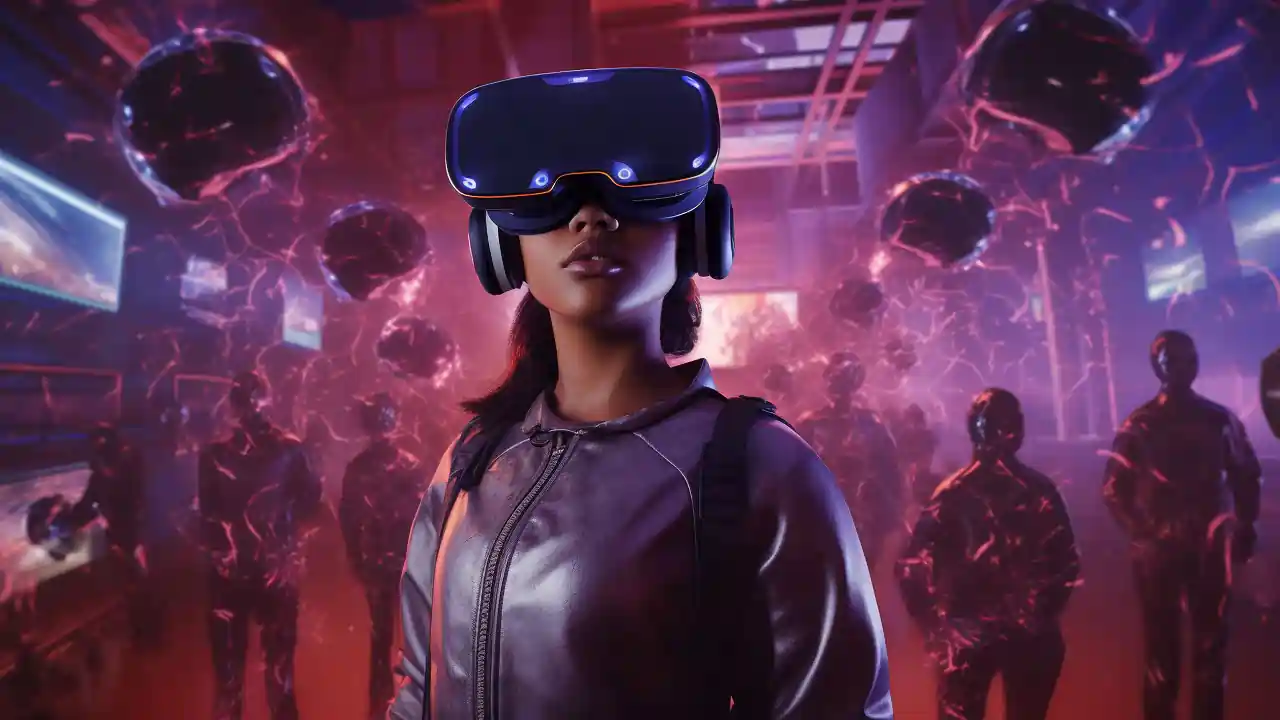Immersive Realities industry is undergoing a transformative revolution, driven by the emergence of Virtual Reality (VR) and Augmented Reality (AR). These technologies are pushing the boundaries of immersion, creating experiences that blend the virtual and real worlds in unprecedented ways. As VR and AR continue to evolve, they are redefining how players interact with games, storytelling, and even each other. In this article, we explore the transformative impact of VR and AR on gaming, the opportunities they present, and the costs associated with this cutting-edge technology.
The Evolution of VR and AR in Gaming

Virtual Reality: Stepping into New Worlds
Virtual Reality immerses players in fully digital environments, allowing them to explore, interact, and engage with games in a way that traditional screens cannot. With advancements in motion tracking, haptic feedback, and realistic graphics, VR is creating gaming experiences that feel lifelike.
- Key Innovations in VR:
- 6DoF (Six Degrees of Freedom) motion tracking for enhanced movement realism.
- Haptic controllers and gloves for tactile feedback.
- High-resolution displays with reduced latency for seamless visuals.
- Top VR Devices:
- Meta Quest 3: Affordable and standalone.
- HTC Vive Pro 2: High-end performance for serious gamers.
- Sony PlayStation VR2: Console-compatible with exclusive titles.
Augmented Reality: Blending Real and Virtual Worlds
Augmented Reality overlays digital elements onto the real world, providing interactive gaming experiences without isolating players from their surroundings. AR is widely accessible through smartphones and AR glasses, making it a more affordable entry point into immersive gaming.
- Key Innovations in AR:
- Real-time environment scanning for precise object placement.
- Multiplayer AR experiences for collaborative gameplay.
- Integration with wearable tech like AR glasses.
- Popular AR Games:
- Pokémon GO: A global phenomenon that introduced millions to AR gaming.
- Harry Potter: Wizards Unite: A narrative-driven AR adventure.
- Minecraft Earth: Bringing creativity to the real world.
3 How VR and AR Are Transforming Gaming
1. Immersive Storytelling
VR and AR bring stories to life by placing players directly in the narrative. VR allows players to explore cinematic worlds as protagonists, while AR integrates story elements into real-world environments.

- Examples:
- VR games like Half-Life: Alyx offer fully immersive campaigns.
- AR games use geolocation to make the player’s environment part of the story.
2. Enhanced Social Interaction
Multiplayer VR and AR experiences connect players like never before. Virtual environments allow players to interact as avatars, fostering a sense of presence and community.

- Examples:
- VRChat offers virtual spaces for socializing and creative expression.
- AR games with multiplayer modes encourage collaboration and competition.
3. Fitness and Movement Integration
Games are no longer confined to a screen. VR and AR encourage physical activity, turning gaming into a fitness experience.

- Examples:
- VR titles like Beat Saber and Supernatural combine exercise with fun.
- AR fitness apps like Zombies, Run! gamify running and workouts.
Economic Costs of VR and AR Gaming
| Expense Category | Estimated Costs (USD) | Notes |
|---|---|---|
| VR Headsets | $300–$1,500 | Varies by brand and performance level |
| AR Glasses/Devices | $500–$2,000 | Includes devices like Microsoft HoloLens |
| High-End Gaming PCs | $1,000–$2,500 | Required for PC-connected VR setups |
| AR-Compatible Smartphones | $500–$1,500 | Many modern phones support AR gaming |
| Accessories (Controllers, Haptics) | $100–$500 | Enhances immersion and interactivity |
Revenue Opportunities in VR and AR Gaming
| Revenue Stream | Estimated Earnings Potential (USD) | Examples |
|---|---|---|
| Game Development | $50,000–$500,000/project | VR/AR games generate high sales margins |
| Hardware Sales | $300M–$1B annually | Driven by growing demand for devices |
| In-Game Purchases (VR/AR) | $10–$100/user/month | Skins, upgrades, and premium content |
| Esports and Tournaments | $1M–$5M per event | VR esports events are gaining traction |
Challenges Facing VR and AR Gaming
Accessibility and Cost
Immersive Realities While VR and AR technology is advancing, the high cost of hardware remains a barrier for many players. Entry-level setups can still feel out of reach for casual gamers.
Technical Limitations
Immersive Realities Both VR and AR face challenges such as motion sickness, battery life, and device weight. Developers must continually improve these aspects to enhance user experience.
Content Development
Creating engaging and optimized VR/AR content is expensive and time-consuming. Developers must balance innovation with commercial viability.
Future Trends in VR and AR Gaming

Mobile AR Expansion
With advancements in smartphone technology, AR gaming is set to grow exponentially. Games that blend mobility with immersion will dominate.
Mixed Reality (MR) Gaming
Mixed Reality combines VR and AR, allowing players to interact with both real and virtual objects seamlessly. MR is expected to redefine gaming experiences in the coming years.
AI-Driven Enhancements
AI will play a crucial role in personalizing VR/AR gaming. From adaptive difficulty to responsive NPCs, AI will make immersive gaming smarter and more engaging.
Step Into the Future: VR and AR Are Redefining Gaming
The Next Level of Gaming Immersion
Immersive Realities Virtual Reality and Augmented Reality are not just innovations—they are revolutions. By transporting players into immersive worlds and blending digital elements with real life, VR and AR are changing how we experience games. With improving technology and increasing accessibility, the potential for these technologies is limitless.
As we look ahead, VR and AR will continue to break barriers, offering opportunities for developers, players, and businesses to explore new dimensions of gaming. Whether you’re wielding a lightsaber in VR or catching Pokémon in your local park with AR, the future of gaming is here—and it’s more immersive than ever before.
